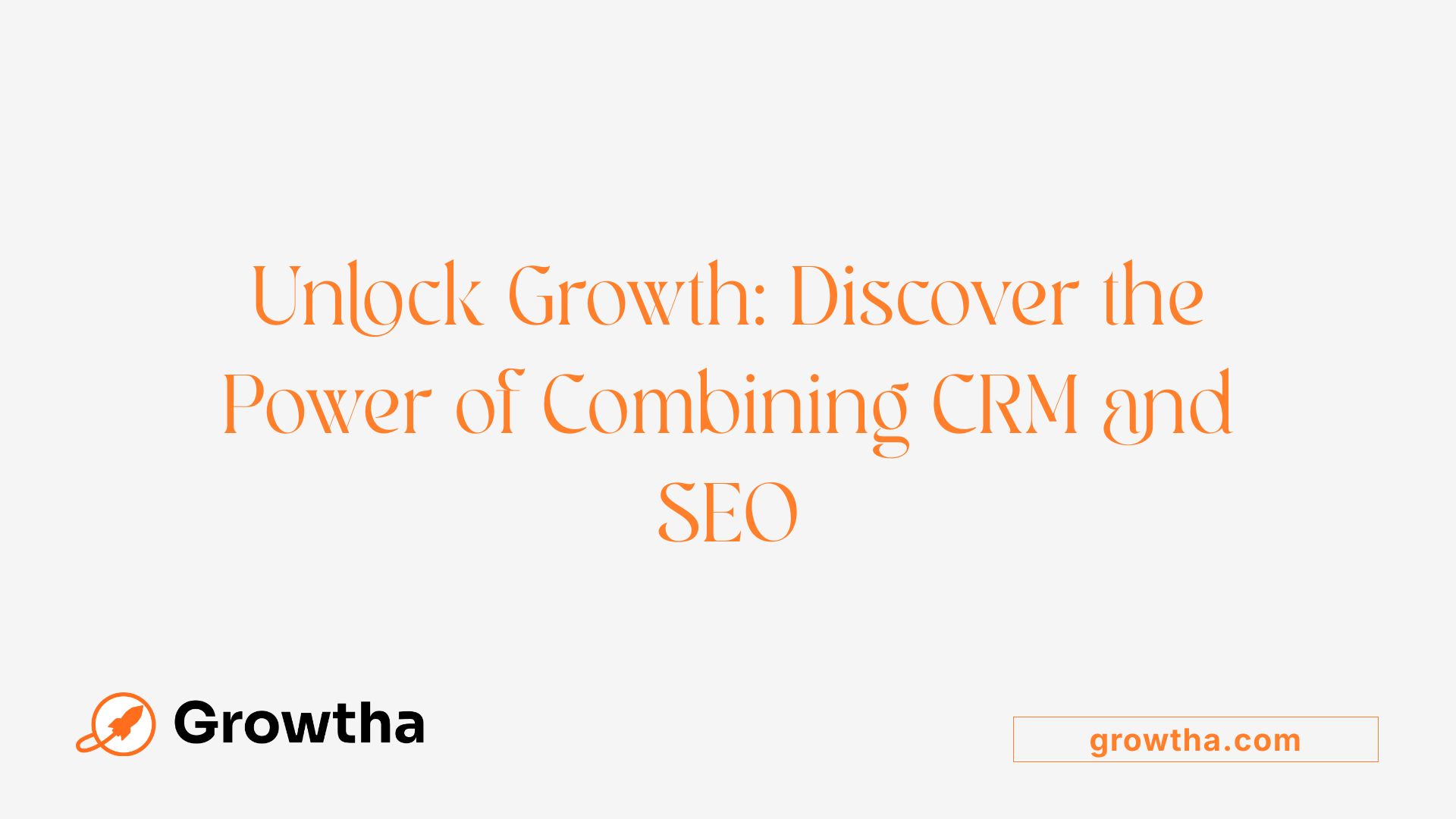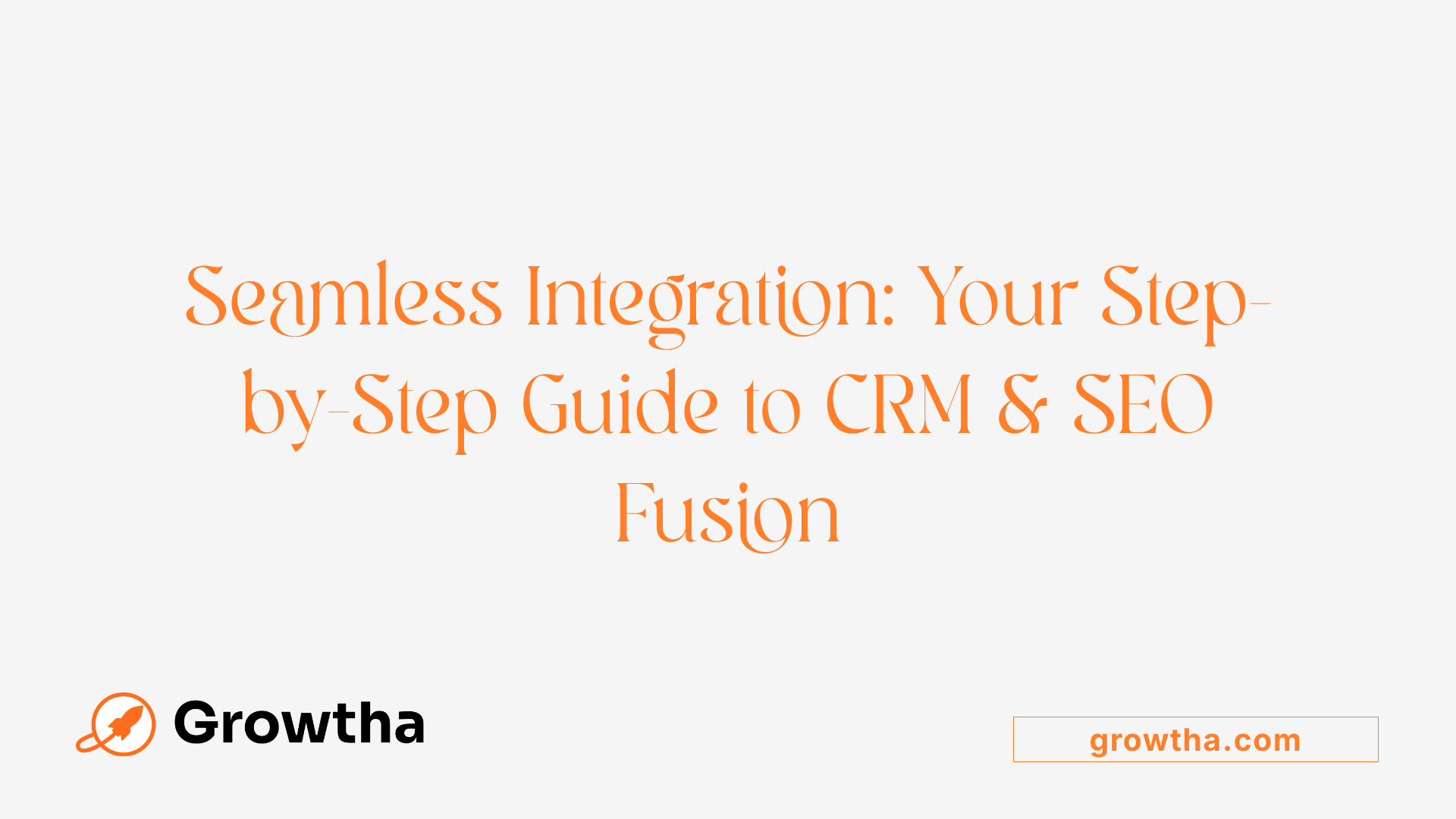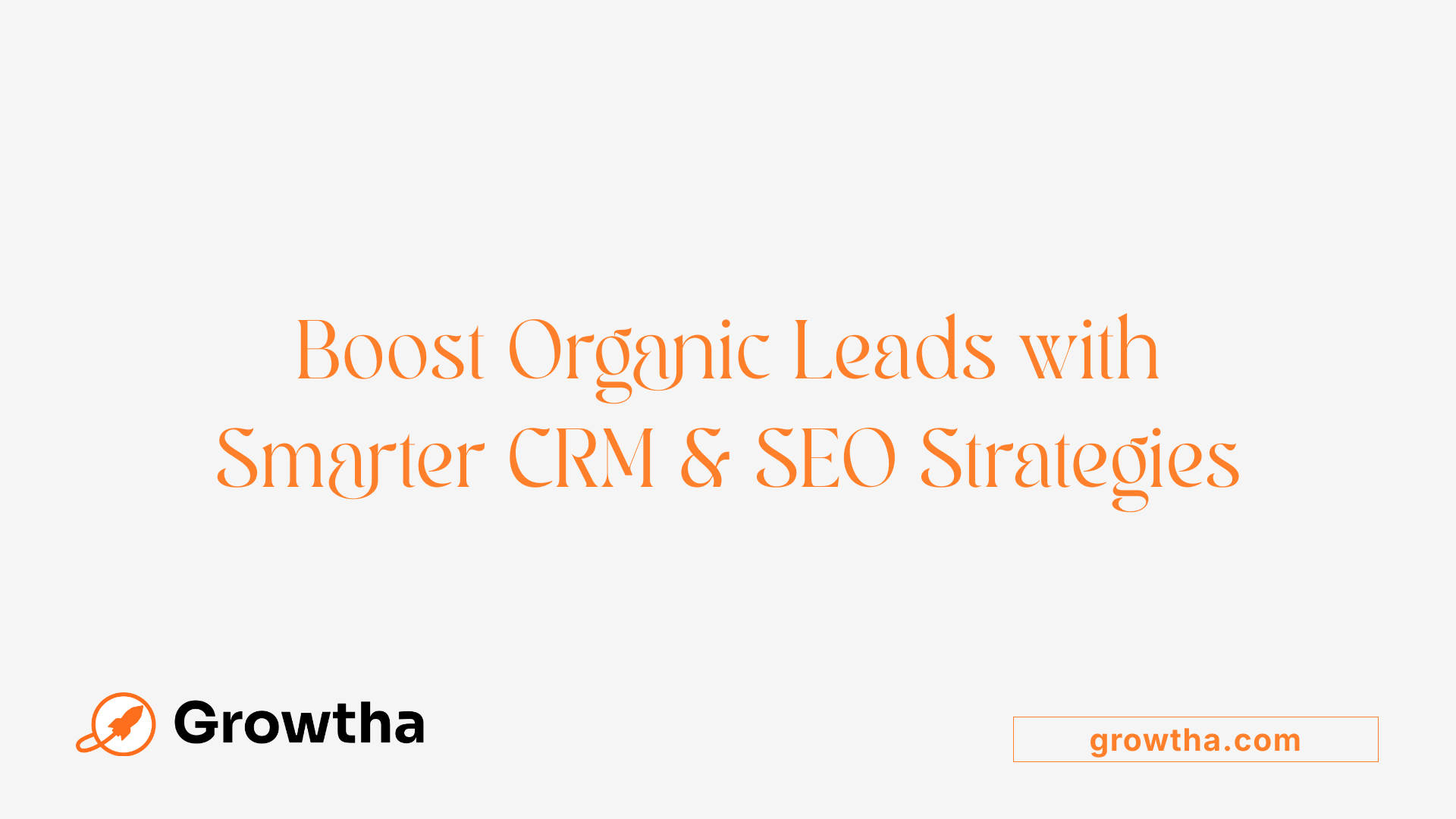In today's competitive digital landscape, integrating Customer Relationship Management (CRM) systems with Search Engine Optimization (SEO) strategies has become essential for effective lead management. This approach not only enhances visibility but also ensures targeted, personalized engagement throughout the customer journey. This article explores the comprehensive process of seamless CRM and SEO integration, highlighting best practices, strategic benefits, and technical steps to optimize your digital marketing efforts for sustained growth.

Integrating Customer Relationship Management (CRM) systems with Search Engine Optimization (SEO) strategies offers substantial advantages for managing and nurturing leads effectively. One of the primary benefits is enhanced lead tracking and analysis. By combining SEO data—such as keyword performance and landing page metrics—with CRM insights—like customer behaviors and preferences—businesses can gain a comprehensive view of their prospects.
This integrated approach enables more personalized marketing efforts. Understanding what content or keywords attract specific customer segments allows for tailoring messaging and offers, which significantly improves engagement. For instance, CRM data about customer pain points and questions can inform SEO campaigns to prioritize relevant keywords and content, ensuring that prospects find solutions aligned with their needs.
Such synergy also leads to better lead nurturing and higher conversion rates. Using A/B testing for landing pages, content, and offers, companies can identify what resonates most with different audiences. This iterative process refines the customer journey, reducing the sales cycle, and boosting the likelihood of conversion.
Furthermore, merging SEO and CRM data supports more informed decision-making. Analytics dashboards can reveal trends in customer interactions, helping marketing teams optimize strategies based on real-world user responses. This continuous feedback loop fosters smarter resource allocation and campaign adjustments.
Lastly, this collaboration enhances the overall customer experience. Personalized content delivery, timely follow-ups, and relevant interactions foster trust and loyalty. When businesses use CRM insights to inform SEO practices, they create a cohesive, user-centric approach that drives sustainable growth.
Aspect Benefit Additional Details Lead Tracking Detailed analysis of lead sources Combines organic search data with customer interactions Personalization Tailored content and outreach Uses CRM data to customize messaging based on behavior Conversion Optimization Improved landing pages and content A/B testing and insights from integrated data Decision-Making Data-driven strategies Real-time analytics for ongoing improvements Customer Experience Enhanced user satisfaction Personalized engagement leads to loyalty
In summary, CRM and SEO integration delivers a unified framework for attracting, understanding, and converting prospects, ultimately fostering stronger customer relationships and business growth.

Implementing CRM and SEO integration involves a series of strategic steps aimed at creating a seamless system that enhances online visibility and customer relationships. The process begins with an assessment of organizational needs and setting clear goals. This includes understanding what customer data is available, identifying gaps, and determining how SEO efforts can be aligned with customer insights.
The next step is selecting suitable tools. Organizations need to choose a CRM platform that supports features like customer segmentation, keyword tracking, and social media monitoring. Compatibility with existing website and analytics platforms is crucial for smooth data flow.
Once the tools are chosen, the focus shifts to data integration and migration. This involves linking the CRM with the website, content management systems, and analytics tools through APIs or integration platforms. Proper data mapping and testing ensure accurate information exchange, enabling a comprehensive view of customer behaviors and preferences.
Using the integrated data, businesses can perform targeted keyword research by analyzing customer conversations, support tickets, and purchase history. This information helps develop personalized, SEO-optimized content and outreach strategies, including guest blogging, email campaigns, and content marketing.
Finally, continuous monitoring and optimization are essential. Regular analysis of SEO performance through CRM analytics allows for adjustments to keywords, content, and campaign tactics. This iterative process ensures ongoing alignment between CRM and SEO efforts, ultimately improving search rankings, increasing website traffic, and strengthening customer engagement.
By following this step-by-step approach, organizations can maximize the benefits of CRM and SEO integration, leading to better lead management, higher conversions, and sustained business growth.
Step Focus Area Key Activities Outcomes 1 Assessment and Goal Setting Understand current state, define objectives Clear roadmap for CRM and SEO alignment 2 Tool Selection Choose CRM with SEO capabilities Compatible, feature-rich tools 3 Data Integration Link systems, migrate data, test connections Unified, accurate database 4 Keyword & Content Strategy Analyze customer data, develop content SEO-optimized, targeted content 5 Monitoring & Optimization Track performance, refine strategies Improved rankings, engagement
This systematic method ensures that CRM and SEO efforts support and enhance each other, leading to more effective marketing and stronger customer relationships.

Integrating data from both SEO analytics and CRM systems creates a comprehensive view of customer behaviors, preferences, and engagement patterns. By sharing insights such as website interactions, lead demographics, and purchase history, teams can develop targeted strategies.
For instance, CRM data like customer pain points and objections can refine keyword targeting and content creation, making search efforts more relevant. Conversely, SEO data on landing page performance and keyword trends guide CRM-driven outreach, nurturing leads effectively.
Maintaining seamless data exchange through APIs or data platforms ensures all teams work with current information, facilitating smarter decision-making and more personalized marketing campaigns.
Utilizing insights from CRM about customer preferences and behaviors allows for tailored content that resonates with different audience segments. Creating personalized landing pages, blog posts, or product descriptions increases relevance, leading to higher dwell time and conversions.
A/B testing of content elements—like headlines, images, or call-to-actions—helps identify what appeals most to customers, continuously refining the user experience. Combined with SEO best practices, such as optimizing meta descriptions and keywords, this approach boosts organic visibility while fostering stronger relationships.
A/B testing is essential for identifying the most effective website and content strategies. Testing different headlines, forms, images, or even personalization tactics provides data on what drives engagement and conversions.
For example, testing variations of landing page layouts can reveal which design elements reduce bounce rates and increase lead captures. Integrating CRM insights into these tests ensures that content aligns with customer needs.
Consistently analyzing test results promotes continuous growth, helping teams adapt quickly to changing preferences and search algorithms.
On-page tactics such as keyword optimization, compelling headlines, and mobile-friendly design make website content easily discoverable and engaging. CRM data on customer questions and pain points can inform content that directly addresses user needs.
Off-page strategies like guest blogging, backlink outreach, and online reputation management are supported by CRM tracking of contacts and outreach history. Proper management helps build authoritative backlinks and increase brand trust, improving SEO rankings.
Integrating these tactics ensures that content and outreach efforts are targeted, relevant, and aligned with customer insights.
Aligning marketing, SEO, and CRM teams fosters a unified strategy focused on delivering value to customers. Regular communication ensures data sharing, coordinated campaigns, and consistent messaging.
Sharing access to integrated platforms and analytics helps all teams measure success holistically. This collaboration accelerates campaign adjustments, improves lead nurturing, and enhances overall digital performance.
By working together, teams can harness their combined expertise to create a customer-centered approach that drives sustainable growth and competitive advantage.

Organizations can significantly boost their organic lead generation by seamlessly combining CRM and SEO strategies. This integration enables businesses to target high-intent keywords effectively and deliver tailored, relevant content that matches customer search behaviors.
CRM data provides deep insights into customer interests, pain points, and behavior patterns. These insights inform workflow strategies such as keyword research, content creation, and landing page optimization—all aligned with the types of queries potential customers are making.
By developing diverse, high-quality content—including articles, guides, videos, and interactive tools—businesses improve their search engine rankings. Such content attracts qualified visitors actively seeking solutions, thereby increasing the likelihood of lead conversions.
Promotion plays a vital role. Sharing valuable content via social media channels and email marketing nurtures leads while building brand authority. Furthermore, analyzing SEO performance alongside CRM analytics enables continuous refinements to targeting and messaging, ensuring more qualified traffic and higher engagement levels.
This approach fosters a sustainable, cost-effective pipeline of organic leads—customers who are already interested in your solutions and ready to engage. Over time, aligned SEO tactics integrated with CRM insights contribute to long-term growth and improved ROI, helping businesses stay competitive in the digital landscape.
Integrating customer data from CRM systems with SEO analytics creates a powerful combination for understanding user behavior and preferences. Businesses can analyze engagement metrics like time on site, scroll depth, and pages per visit to identify what interests their audience most.
This data helps tailor content strategies, including creating relevant blog posts, videos, and landing pages that align with customer pain points and search intent. For example, insights from CRM, such as common questions and job titles, guide the development of targeted keywords and content topics.
A/B testing is crucial for refining website elements like headlines, images, and calls to action. By experimenting with different variations, companies can determine what drives higher engagement and conversions, ensuring each touchpoint is optimized for the audience.
Aligning sales and marketing teams is vital. Sharing integrated data allows for consistent messaging and nurtures leads more effectively through every stage of the customer journey.
Furthermore, personalized campaigns based on CRM insights—such as segmenting leads by behavior or industry—boost relevance and strengthen relationships. Continuous analysis of campaign performance and feedback ensures strategies evolve with changing customer needs.
In summary, linking CRM and SEO efforts enhances lead quality, improves content relevance, and leads to better resource allocation, culminating in higher ROI. This integrated approach supports sustained growth by making marketing efforts more targeted, measurable, and adaptable.

CRM data provides valuable insights into customer preferences, behaviors, and pain points. This information allows marketers to create targeted content that aligns with what potential customers are actively searching for, making SEO efforts more effective.
One of the most practical uses is keyword research. Customer conversations, inquiry forms, and support tickets reveal specific terms and phrases customers use. By analyzing these insights, marketers can identify relevant long-tail keywords and topic areas to target in their content strategies.
CRM data also helps in optimizing website user experience and navigation. Understanding how customers interact with your site—such as the pages they visit, questions they ask, and common objections—enables you to tailor your website layout, content, and calls to action for better engagement.
Furthermore, CRM insights support content personalization and timing. For example, segmentation based on customer location, industry, or stage in the buyer’s journey allows delivery of highly relevant content, increasing the chances of conversion. Geotargeting campaigns and personalized email marketing are boosted through CRM-driven segmentation.
Reputation management benefits from CRM by monitoring reviews and feedback from satisfied customers. Positive reviews can be encouraged and showcased, elevating your brand’s online authority and trustworthiness, which indirectly benefits your SEO.
Integrating CRM data with SEO strategies also enhances performance tracking. Marketers can analyze data to refine keywords, improve landing pages, and adjust content according to user engagement metrics like dwell time and bounce rates. Over time, this leads to higher search rankings and increased organic traffic.
Ultimately, leveraging customer data in these ways creates a more cohesive and targeted online marketing approach, resulting in stronger visibility, higher quality leads, and sustainable business growth.
Integrating CRM with SEO is a transformative approach that empowers marketers to deliver personalized, targeted, and efficient campaigns. This synergy enhances every stage of the sales funnel—from attracting potential leads through optimized content and keywords to nurturing relationships via tailored communications. By leveraging comprehensive data analytics, continuous A/B testing, and cross-department collaboration, businesses can not only amplify their organic lead generation but also improve overall marketing ROI. Implementing these integrated strategies ensures a resilient, scalable, and customer-centric marketing ecosystem capable of adapting to evolving digital trends. Ultimately, mastering CRM and SEO integration is essential for any organization seeking long-term success and competitive advantage in the digital age.